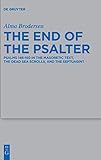The End of the Psalter : Psalms 146-150 in the Masoretic Text, the Dead Sea Scrolls, and the Septuagint / Alma Brodersen.
Material type: TextSeries: Beihefte zur Zeitschrift für die alttestamentliche Wissenschaft ; 505Publisher: Berlin ; Boston : De Gruyter, [2017]Copyright date: ©2017Description: 1 online resource (X, 321 p.)Content type:
TextSeries: Beihefte zur Zeitschrift für die alttestamentliche Wissenschaft ; 505Publisher: Berlin ; Boston : De Gruyter, [2017]Copyright date: ©2017Description: 1 online resource (X, 321 p.)Content type: - 9783110534764
- 9783110534955
- 9783110536096
- 223.206 23
- BS1430.2 .B763 2017
- online - DeGruyter
- Issued also in print.
| Item type | Current library | Call number | URL | Status | Notes | Barcode | |
|---|---|---|---|---|---|---|---|
 eBook
eBook
|
Biblioteca "Angelicum" Pont. Univ. S.Tommaso d'Aquino Nuvola online | online - DeGruyter (Browse shelf(Opens below)) | Online access | Not for loan (Accesso limitato) | Accesso per gli utenti autorizzati / Access for authorized users | (dgr)9783110536096 |
Frontmatter -- Preface -- Contents -- I. Introduction to Psalms 146–150 -- II. Psalm 150 -- III. Psalm 149 -- IV. Psalm 148 -- V. Psalm 147 -- VI. Psalm 146 -- VII. Conclusion -- VIII. Abbreviations and Bibliography -- Subject Index -- Index of Sources
restricted access online access with authorization star
http://purl.org/coar/access_right/c_16ec
Psalms 146-150, sometimes called “Final Hallel” or “Minor Hallel”, are often argued to have been written as a literary end of the Psalter. However, if sources other than the Hebrew Masoretic Text are taken into account, such an original unit of Psalms 146-150 has to be questioned. “The End of the Psalter” presents new interpretations of Psalms 146-150 based on the oldest extant evidence: the Hebrew Masoretic Text, the Hebrew Dead Sea Scrolls, and the Greek Septuagint. Each Psalm is analysed separately in all three sources, complete with a translation and detailed comments on form, intertextuality, content, genre, and date. Comparisons of the individual Psalms and their intertextual references in the ancient sources highlight substantial differences between the transmitted texts. The book concludes that Psalms 146-150 were at first separate texts which only in the Masoretic Text form the end of the Psalter. It thus stresses the importance of Psalms Exegesis before Psalter Exegesis, and argues for the inclusion of ancient sources beyond to the Masoretic Text to further our understanding of the Psalms.
Issued also in print.
Mode of access: Internet via World Wide Web.
In English.
Description based on online resource; title from PDF title page (publisher's Web site, viewed 28. Feb 2023)


